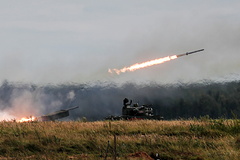NYT: Russian diplomats will move nuclear missiles closer to the US if the West does not accept the demand
Photo: Maxim Shemetov / Reuters
Western diplomats said that during the talks their Russian colleagues hinted at moving nuclear missiles “closer to US shores.” The New York Times writes about this, citing a source close to the negotiations.
According to the source, Moscow will agree to this if the West does not accept the Kremlin's demands for security guarantees in Europe.
How exactly the hints were expressed is not specified in the text. In addition, the publication does not provide information about countries and territories located “closer to the shores of the United States.” At the same time, it is specified that such a solution will help reduce the time of approach to the target to five minutes. The authors of the article compared such intentions with the Caribbean crisis of the early 1960s, when the USSR deployed atomic weapons in Cuba.
NATO and Security Negotiations
On January 16, NATO Secretary General Jens Stoltenberg, in an interview with the American CBC television channel, said that the alliance had offered Russia to negotiate security in Europe, including the situation around Ukraine, but had not yet received a response.
No, they did not commit themselves to take part in further negotiations, but they did not reject the proposals either.

Jens Stoltenberg NATO Secretary General
In the same interview, he responded to demands for the withdrawal of the military from the countries of the alliance. According to him, NATO will not agree with the withdrawal of its military from the countries that joined the North Atlantic Alliance after 1997.
Of course, we also cannot agree that we should not have NATO troops in all those countries that have joined NATO since 1997. This will essentially mean that half of our members will not be able to be protected by NATO troops. Then they'll be sort of second-class NATO members, we'll never make it

Jens Stoltenberg NATO Secretary General
In addition, Stoltenberg said that the North Atlantic Alliance is ready to discuss with Russia the reduction of weapons, including nuclear ones.
We are ready to participate in balanced, verifiable measures to reduce weapons – conventional and nuclear missiles, as well as in many other measures that will be useful for Russia and for NATO.

Jens Stoltenberg NATO Secretary General
New Cold War
Both in the United States and in Russia, politicians have recently noted signs of the Cold War. Thus, a member of the US House of Representatives, Republican Michael McCall, answered in the affirmative the corresponding question of a CNN correspondent. The journalist asked McCall if he thought the Cold War with Russia had already begun.
Yes. Yes, because I think that (Russian President Vladimir) Putin has once again smelled weakness here.

Michael McCall Member of the US House of Representatives
At the same time, Russian Deputy Foreign Minister Alexander Grushko said on January 12 that in order to ensure security in Europe, the North Atlantic Alliance returned to using the tools of the Cold War era. Grushko noted the deterioration of the “security landscape” in Europe, blaming NATO for this.
He also added that the alliance puts the containment of Russia at the forefront and allocates colossal resources for this. In addition, Grushko blamed NATO for the complete degradation of the arms control system that, as a result of the Cold War, developed between Russia and the alliance. Among other things, he recalled the collapse of the agreements on the INF Treaty, initiated by the United States.
We pointed out very honestly, bluntly, without any attempts to round corners, to use any politically correct formulas, that a further slide in the situation could lead to the most unpredictable and most serious consequences for European security.

Alexander GrushkoDeputy Foreign Minister of Russia
Security talks
On January 10, negotiations were held in Geneva on guarantees of security and strategic stability between the delegations of Russia and the United States. According to a State Department official, in total, the discussion between the officials of the two countries lasted about 7.5 hours.
On January 12, a meeting of the Russia-NATO Council took place in Brussels. The Russian delegation at the meeting was represented by Deputy Foreign Minister of the Russian Federation Alexander Grushko and Deputy Minister of Defense of the Russian Federation Alexander Fomin. On behalf of NATO, the talks were attended by Secretary General Jens Stoltenberg and representatives of 30 resident countries of the alliance. On January 13, a meeting of the Permanent Council of the Organization for Security and Cooperation took place in Vienna, where Russian proposals were discussed.

